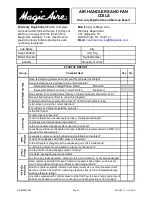
McQuay IM 777-3
27
Service and Maintenance
Figure 36: Sheave Adjustment
Fan Drive Belt Adjustment
General Rules of Tensioning
1
The ideal tension is the lowest tension at which the belt
does not slip under peak load conditions.
2
Check tension frequently during the first 24 to 48 hours of
operation.
3
Over tensioning shortens belt and bearing life.
4
Keep belts free from foreign material that can cause
slippage.
5
Inspect V-drive on a periodic basis. Adjust tension if the
belt is slipping. Do not apply belt dressing. This can
damage the belt and cause early failure.
Tension Measurement Procedure
1
Measure the belt span. See Figure 37.
2
Place belt tension checker squarely on one belt at the center
of the belt span. Apply force to the checker, perpendicular
to the belt span, until the belt deflection equals belt span
distance divided by 64. Determine the force applied while
in this position.
3
Compare this force to the values in Table 17.
Figure 37: Drive Belt Adjustment
A d j u s t a b l e
C e n t e r - F l a n g e
F i x e d
C e n t e r - F l a n g e
S t a t i o n a r y
E n d - F l a n g e
C a p s c r e w s
( D o N o t R e m o v e )
( 2 ) L o c k i n g
S e t s c r e w s " A "
F l a t h e a d S o c k e t S c r e w s
( D o N o t R e m o v e )
I n n e r L o c k i n g - R i n g
O u t e r
L o c k i n g - R i n g
S p l i t T a p e r
B u s h i n g
( 3 ) H o l e s f o r
S p a n n e r W r e n c h
o r D r i f t
Belt span
Deflection =
Belt span
64
WARNING
Moving belt and fan can cause severe personal injury or
death.
During installation and filter maintenance:
•
Verify that the belt and fan guards on plenum fan units are
always in place.
•
Lock and tag out fans to prevent accidental start up.
•
Do not enter the filter compartment until the fan is
completely stopped.
•
Use approved equipment for reaching filters located above
normal reach. Do not step on filter frames or unit
components.
•
Floor surfaces must be dry and free of oil or grease.
WARNING
Pendant l’installation et où l’entretien des filtres, une
courroie en mouvement ou un ventilateur en opération
peuvent causer des blessures graves où même causer la
mort.
•
S’assurer que les gardes de courroie et de ventilateur sont
toujours en place.
•
Verouiller les démarreurs des ventilateurs et afficher un avis
de mise-en-garde afin de prévenir tout accident ou
démarrage.
•
Attendre que le ventilateur soit complètement arrêté avant
d’entrer dans l’unité.
•
Utiliser seulement des équipements approuvé pour joindre
les bancs de filtres; ne pas mettre soit sur les cadres des
filtres ou même sur toutes composantes de l’unité.
•
La surface des planchers doit être sec et libre de toute trace
d'huile et où de graisse.



































